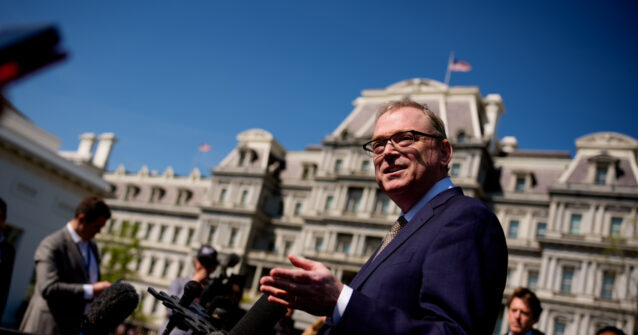Businesses invest more when it’s cheaper to do so. A new study puts numbers on just how much more—and the results could reshape the tax debate unfolding in the U.S. Senate.
The paper, released Monday by the National Bureau of Economic Research, finds that cutting the cost of business investment leads to a much larger increase in capital spending than government budget analysts have long assumed. Specifically, the study shows that a one percentage point reduction in the cost of capital triggers a 1.7 to 3.0 percentage point increase in the business investment rate—roughly two to five times the response forecast by official models.
While the concept may sound technical, the logic is straightforward: firms are more likely to buy new equipment, expand factories, or upgrade technology when tax policy makes it less expensive. The study measures this by analyzing what happened after the 2017 Tax Cuts and Jobs Act (TCJA), which cut the corporate tax rate and temporarily allowed companies to immediately deduct the full cost of many investments—a provision known as full expensing.
The authors—Jonathan Hartley, Kevin Hassett, and Joshua Rauh—use asset-level data to isolate how investment behavior changed across industries. They treat the TCJA as a natural experiment, calculating how the reduction in what economists call the “user cost of capital” translated into real-world business decisions. Hassett is Donald Trump’s National Economic Director, making him the top economic advisor to the president. Hartley is a Policy Fellow at the Hoover Institution and an economics PhD Candidate at Stanford University. Rauh is a professor of finance at Stanford Graduate School of Business and a senior fellow at the Hoover Institution.
That user cost refers to the after-tax rate of return a firm needs to justify an investment. Lower that hurdle, and more projects make economic sense. Policymakers and forecasters have traditionally assumed a modest link between tax changes and investment. The new research suggests that connection is far more powerful.
“We extend an old literature on the relationship between investment and user cost of capital using the Tax Cuts and Jobs Act of 2017 as a natural experiment,” Mr. Hartley wrote Monday on X. “Our results suggest that corporate tax reforms can play a more pro-growth role in boosting GDP per capita than past literature estimates… Making full expensing permanent is possibly the most pro-growth tax policy one could pursue.”
The findings arrive just as Senate negotiators work to finalize the One Big Beautiful Bill Act (OBBB), which includes a revival of 100 percent bonus depreciation through 2029. Some lawmakers are pushing to make the expensing provisions permanent, a move likely to trigger opposition from budget scorekeepers concerned about the long-run revenue impact.
But the Hartley-Hassett-Rauh paper argues that capital expensing is not just pro-investment but especially potent over time. The investment response they observe grows larger several years after the TCJA passed, peaking in 2021 and 2022. That pattern suggests temporary measures may underperform relative to permanent reforms.
The study draws on detailed BEA data across 93 asset types, tracking how investment shifted in response to changes in effective tax rates and depreciation rules. Assets that benefited most from expensing—like equipment and machinery—saw significantly higher investment growth than assets that were less affected by the tax changes.
The authors also decompose the relative effects of the TCJA’s corporate rate cut and its expensing provisions. They find that much of the increase in investment, particularly in later years, was driven by changes to capital cost recovery rules. In other words, bonus depreciation may have had an even greater impact on business investment than the headline rate reduction.
“The corporate tax rate (tau) changes in TCJA… as well as full expensing… are both captured by the user cost of capital measure,” Mr. Hartley wrote. “Cost of capital falls when the corporate tax rate falls or [when] the present value of tax depreciations changes through changes in expensing rules.”
The research builds on prior work by Hassett and other economists, updating the natural experiment methodology to reflect the post-2017 environment. The authors conclude that if Congress is looking for investment-driven growth, permanent full expensing may be the most effective lever available.
With the Senate expected to mark up the OBBB in the coming weeks, the study may help shape both the policy debate and the scoring assumptions used to evaluate the bill’s impact on growth and revenues.
Read the full article here
